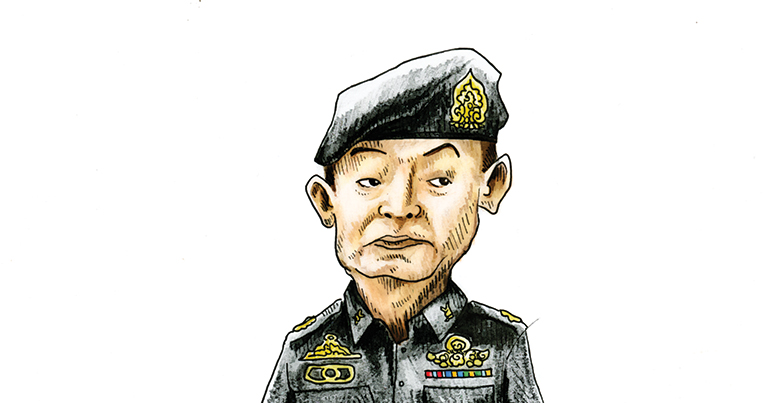The appointment of General Apirat Kongsompong as head of Thailand’s armed forces signals a profound shift in the factional makeup of the military’s highest echelons – and puts the Kingdom’s army in the hands of a man who has threatened to unleash yet another coup if next year’s long-awaited elections don’t go according to plan
Who is he?
As the son of the general who led Thailand’s military in the 1991 armed overthrow of Thailand’s first democratically elected government since 1976, General Apirat Kongsompong might not seem the most obvious choice for the man charged with overseeing the return to civilian government. The veteran of the arch-royalist Wong Thewan division of the King’s Guard military faction has nevertheless built up a strong relationship with Prime Minister Prayuth Chan-ocha, who rose through the ranks of the rival Queen’s Guard military clique alongside the other ringleaders of the 2014 coup that thrust the general to power.
What’s all this about King’s Guards and Queen’s Guards?
Thailand’s military elite largely trace their lineage through two separate factions within the ranks of the armed forces, each under the personal patronage of either the sovereign or queen mother. The heavyweights of the 2014 coup and the so-called National Council for Peace and Order that it spawned are dominated by the Queen’s Guard faction of the Thai military. Apirat’s appointment signalled a profound shift in the military’s highest echelons, said Thitinan Pongsudhirak, director of the Institute of Security and International Studies at Chulalongkorn University. “General Apirat’s appointment shifts the army’s line of command back to the traditionally powerful First Infantry Division, away from the Second Infantry Division, which has firmly controlled the top brass over the past decade,” he said. “As the Second Division that features the Queen’s Guard regiment loses influence to the First Division, military factionalism is likely to be more balanced.”
Why is he in the news?
Since being declared the new commander in chief of Thailand’s armed forces, Apirat has cast something of a cloud over next year’s long-awaited elections by publicly promising yet another military coup in the event of potential “political unrest”. Apirat, as secretary general of the junta’s so-called National Council for Peace and Order and head of its Peacekeeping Force, which has direct control over both the police and armed forces, is well-placed to follow through on such a threat – possibly with the backing of his palace patrons.
[manual_related_posts]
So what does this mean for next year’s election?
With the long-awaited elections promised for February and Prayuth Chan-ocha apparently set on throwing his hat into the ring, support from the incumbent’s allies within the armed forces will be crucial to his success. Thitinan told Southeast Asia Globe that while Apirat’s job was generally regarded as the de-politicisation of a military that has had few qualms about taking a heavy hand in the nation’s governance, the general’s recent comments have done little to inspire confidence in his impartiality. “People are looking for a more professional military and a more capable political class to lead Thailand,” he said. “But his most recent comments and posture suggest General Apirat may be more conservative and glued to the military mindset that it has a right to intervene when it deems necessary. Such a view does not augur well for democratic development.”
This article was published in the December 2018 edition of Southeast Asia Globe magazine. To subscribe to our newsletter, click here.

